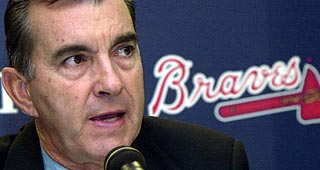It?s still hard to imagine that the general manager star of John Schuerholz could have gotten any brighter than it was in Kansas City, where he held the reigns from 1982 to 1990, and won the World Series in 1985. Now, his star is more like a galaxy in Atlanta, where he recently came out with a new book after guiding the Braves to 14 consecutive division titles.
Schuerholz has built and directed the Braves to regular season success that is unprecedented in any sport at any time in history through shrewd trades and an unwavering belief in building through the farm system. Also, like many of his other peers who have seemed to master the position at times, he has a clear view on what a baseball player should look like, and has gone straight forward in getting those types of players.
The key to Schuerholz?s team building principles is to build from within and fill out the roster with key veterans who can show the younger players how to act and win like major leaguers. This was never more evident than in 2005, when the Braves, forced to by injuries and a lack of payroll flexibility, had to bring up a host of rookies from their system, who were quickly dubbed, ?The Baby Braves.? These included Jeff Francoeur, Brian McCann, and Wilson Betemit.
This group, along with the leadership and skills of players like John Smoltz and Andruw Jones, the Braves were able to keep the streak alive for at least one more season. Their system has been flush with talent for many years, ranking in the top seven for organizational talent since 2001 by Baseball America.
The organizational philosophy has been to draft a large number of high school players and then develop them using people who are familiar with the system to teach them the Braves? way of playing baseball. This is very key because if you don?t have continuity in the minor leagues, you can?t have that chemistry with the major league club. The Braves are one of the few contending teams in baseball who have the majority of their roster come from their system, which is another symbol of the talent of Schuerholz.
This doesn?t mean that Schuerholz shies away from trades or free agent, because he is a master at finding the player needed for depth or snatching a star he can build around. This was very evident with his moves to pick up Greg Maddux and Fred McGriff, both of which were key members of the 1995 World Series champion team.
Still, Schuerholz also finds the lesser known player to fill a hole on the roster, like the pick-ups of John Burkett, Kerry Lightenberg, and Johnny Estrada. These moves have kept the Braves competitive through injuries and underachieving performances and allowed them to keep their streak alive.
Another key cog in this manager Bobby Cox, who Schuerholz said in his book, that he admired even when Schuerholz was in Kansas City. Schuerholz lets Cox handle his job solely on his own, which is key in their lasting relationship.
Still, this season looks like then end of the line for division titles and puts an exclamation point on a run that even with all of the regular season success will still be marked by some for its postseason failure. Schuerholz is the best general manager in the league, but speculation will always be there until more postseason success comes the way of the Atlanta Braves.
Signature Move: In 1993, with the Braves 10 games out of the division, John Schuerholz made the move of the year by picking up the Crime Dog, Fred McGriff, and went onto overtake the Giants and win the division. This move came a few months after the signing of ace Greg Maddux and embodied his philosophy of always being cautious buyers. Schuerholz never thinks his team is out of it and will always add the piece to push them over without endangering the team?s future.


